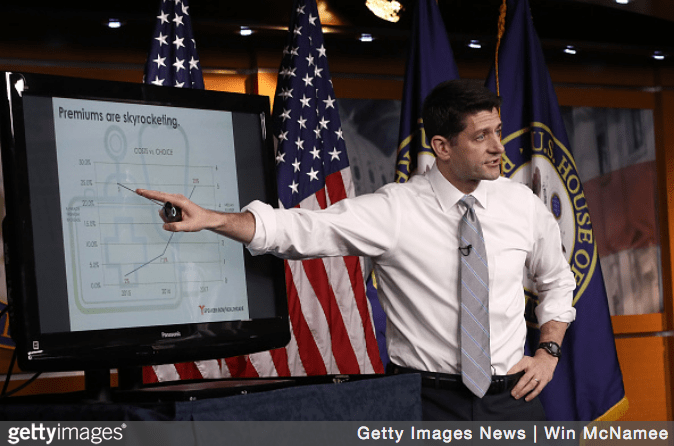Congress doesn’t know how much the American Health Care Act will cost or what its impact will be on the federal deficit, but the Republicans’ plan to repeal and replace Obamacare passed two Congressional committees Thursday with President Donald Trump’s encouragement.
Those who’ve seen the details released so far say it would impose higher costs on some of those who gained insurance under Obamacare while putting millions of Americans at risk of losing their health insurance altogether. Here, it could strain Long Island’s hospitals that serve the most vulnerable population, put severe pressure on health insurance companies, and raise the tax burden on New Yorkers.
Rep. Peter King (R-Seaford), who could play a key role when the final bill comes up for a vote on the House floor, said he has serious concerns about the proposal.
“I have concerns about how many people are going to fall through the cracks and how big a fiscal impact it will have on New York,” he told the Press.
“I am certainly not convinced to vote for it,” he said. “It’s going to cost New York billions of dollars, mainly because of the cuts in Medicaid as we go forward.” He put the figure at $4 billion. But he didn’t expect the final version to be ready for passage for at least two weeks at the earliest.
“It’s still a work in progress,” the Congressman said.
His Republican colleague from Long Island, Rep. Lee Zeldin (R-Shirley), did not respond to repeated calls for comment although thousands of Suffolk residents in his district stand to lose their coverage.
“At first look, it appears that the House bill neither truly repeals nor meaningfully replaces the Affordable Care Act,” said Janine Logan, senior director of communications and population health at the Nassau-Suffolk Hospital Council, which represents all Long Island’s 23 hospitals including Northwell Health (formerly North Shore-LIJ Health System) and Catholic Health Services’ facilities.
“This is bad news for New York,” she said. “Capping Medicaid funding will be financially devastating to the state budget and to the thousands of New Yorkers with modest incomes, many of whom are elderly or disabled, who will no longer be guaranteed coverage. About 70 percent of the Medicaid spending is for the elderly and disabled of all ages. Continuing Medicare and Medicaid cuts to hospitals without reducing the number of uninsured patients they will have to serve is just as devastating.”
She explained that the House bill fundamentally alters the structure of Medicaid, shifting a greater burden from the federal government to the states. Under the ACA, New York State greatly expanded its Medicaid program. “It is how on Long Island the uninsured rate has gone from 10 percent to 5 percent in three years,” Logan explained.
According to Gov. Andrew Cuomo’s office, approximately 300,000 Long Islanders are at risk if Obamacare is repealed. The state could lose $2.4 billion annually. But part of the problem of assessing what the Republicans have approved so far in their rush to make President Trump’s campaign promise come true is that their alternative omits key details.
As Logan put it, “The House plan has not yet been scored for cost by the Congressional Budget Office, and it does not provide specifics on how its provisions would be paid for.”
What is known so far, she said, is that it would eliminate current tax credits and cost-sharing subsidies.
“The most generous assistance under the ACA has gone to those with low to modest incomes,” Logan said. “The plan instead offers limited tax credits based on age and not income.”
According to a recent study by S&P Global Ratings, up to 10 million Americans would lose the health insurance they gained through Obamacare. Insurers would be allowed to charge people between the ages of 50 and 64 insurance premiums at five times the rate charged to younger people—under the ACA it was three times. Tax credits would reportedly begin at $2,000 for people in their 20s, and gradually increase to $4,000 for people over age 60.
“If the intent here is to not only repeal but improve upon the Affordable Care Act, we don’t think the House bill meets that standard,” said Terry Lynam, a spokesman for Northwell Health. “There’s not a lot to like about it.”
Hospitals that rely on Medicaid funding to offset the cost of providing care to their population could be harmed by the new reform as it’s been rolled out so far, he noted.
“In New York you have a lot of hospitals that are barely breaking even or are in the red,” he said. As for Northwell Health, widely regarded as one of the most successful health care providers in the region, its operating margins are still thin, he said, so any additional impact could be damaging in the long run.
“We recognize that there are flaws in the Affordable Care Act, but we think it needs to be renovated, not demolished.”
Professor Debra Dwyer, a health economist at Stony Brook University in the College of Engineering who specializes in public policy, has been studying the health care issue for some time. She told the Press that she’s alarmed by the details she’s seen so far in the House Republicans’ new plan.
“It’s kind of amazing to me how they’re targeting the vulnerable populations,” she said. “They’re literally targeting older people and poorer people—those who are more likely to be sick—and their argument is that they cost us more. But the whole reason for having a social welfare network system is to protect the most vulnerable, which is why Medicare came about: to cover the aged and the disabled. Now they’re targeting the 50-64 year olds who are going to have to get less in tax credits and pay higher premiums.”
For Long Island’s health care system, the impact could be severe as well, she noted.
“We have some hospitals that are going to be hit pretty hard,” she said, singling out Stony Brook University Hospital and Brookhaven Memorial Hospital Medical Center in particular because they serve Suffolk County’s more vulnerable population and made investments in response to incentives from the Affordable Care Act.
“They took in a lot of the uninsured,” Dwyer said. “They did it in good faith that they would have these Medicaid expansions, and people are getting coverage.” But these hospitals could take a hit in reimbursements, she explained, and end up with uninsured people coming to their emergency rooms because they could not afford to see doctors regularly. She said that many insurance companies that serve Long Island also created Medicaid plans based on its expansion under the ACA, but if it’s retracted as proposed by the House bill, then these companies won’t get the return on their investment.
“There’s a lot of companies we have to worry about,” she said. “The hospitals are going to feel it. The health insurance companies are going to feel it. The hundreds of thousands of people that are going to lose coverage are going to feel it.”
She pointed out that the Republicans in Congress have specifically targeted funding for Planned Parenthood, which is the primary source of breast cancer screenings and maternal care for poor women. She said the cuts “will increase the number of unwanted babies because of birth control, and it’s also going to increase cancer.”
She was skeptical of the Republicans’ plan to offer health care savings accounts as a safety net.
“These vulnerable populations are living paycheck to paycheck,” Dwyer said. “They don’t have savings. They can’t afford to lay out the money for insurance and wait for a tax refund—and the tax refund they’d be getting back is not going to be big enough.”



























